|
|
|
Sort Order |
|
|
|
Items / Page
|
|
|
|
|
|
|
| Srl | Item |
| 1 |
ID:
101011
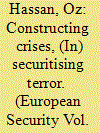

|
|
|
|
|
| Publication |
2010.
|
| Summary/Abstract |
The European Union's (EU) counter-terrorism strategy has been particularly dynamic, developing as a result of 'crises' and subsequent post-crisis narrations. The events of 11 September 2001, and the Madrid and London bombings have proved to provide moments of punctuation from which policy evolution and institutionalisation has followed. As a result of such crises, the EU has increasingly regarded terrorism as a direct challenge to the Union's role as a security actor and sought to institutionalise a diverse range of security governance technologies across its multiple pillars. Such an approach is noticeable for its qualitative difference compared to EU strategy pursued throughout the end of the twentieth century, and demonstrates an increased willingness for the EU to assert its role in the world. Yet, what is highly noticeable from the EU strategy and the proliferation of security governance technologies is the manner in which the EU has securitised 'terrorism' in the pursuit of internal, external and normative objectives. As a consequence, the EU has inflated the threat posed by terrorism, and increasingly attempted to 'Europeanise' its response. Evident in such a strategy however, is the manner in which counter-terrorism practices can generate greater insecurity inside and outside of the Union.
|
|
|
|
|
|
|
|
|
|
|
|
|
|
|
|
| 2 |
ID:
101014


|
|
|
|
|
| Publication |
2010.
|
| Summary/Abstract |
The resolution of the Israeli-Palestinian conflict has long occupied a prominent place on the foreign agenda of the European Union (EU). Over the past 40 years, the member states of the EU have defined with increasingly coherence their approach to the resolution to the Israeli-Palestinian conflict: a commitment to Israel's right to live in peace and security and support of the Palestinians to national self-determination. At the same time, European discourse on the Israeli-Palestinian conflict has shifted as its own internal needs and strategic concerns have changed. This changing narrative has impacted critically on the policy instruments and approach adopted by the EU to the conflict. Through an analysis of European statements and speeches, this article argues that European discourse in the 1980s and 1990s was underscored by a normative, justice-based framing. The collapse of peace process in 2000 has led to a noticeable securitization of European discourse on the conflict, one now marked by a growing sense of 'risk, danger, and urgency' and a fear that the conflict has begun to impact negatively on its domestic stability.
|
|
|
|
|
|
|
|
|
|
|
|
|
|
|
|
| 3 |
ID:
101012


|
|
|
|
|
| Publication |
2010.
|
| Summary/Abstract |
This article aims at analysing different, partly overlapping and partly competing European security discourses that have emerged on the Iranian nuclear issue since 2003. Three main discursive themes have been singled out exemplifying the main identity representations of Iran and Europe, the main stances towards Iran and the representations of the nature of European foreign policy. Over the years, the coercive-securitisation discourse has become hegemonic over democracy promotion and cultural diplomacy-inspired discourses and European policies have consistently followed suit. In terms of security governance, the European Union (EU) has created a format for negotiations, which has undergone subsequent enlargements, consistent with its securitised but multilateral discourses. While the nature of the collegial security governance espoused has brought positive effects in terms of reinforcing the EU's own identity as an international actor both inside and outside, the resilience of the first discursive theme throughout the process despite other international actors' dissonance signals that a more comprehensive and inclusive discourse towards the Iranian nuclear issue has failed to emerge.
|
|
|
|
|
|
|
|
|
|
|
|
|
|
|
|
| 4 |
ID:
101005
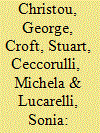

|
|
|
|
|
| Publication |
2010.
|
| Summary/Abstract |
The central aim of this article is to discuss the question of how we can understand and explain the European Union (EU) as a security actor - in essence, to elaborate on the current literature on security governance in order to provide a more theoretically driven analysis of the EU in security. Our contention is that whilst the current literature on security governance in Europe is conceptually rich, there still remains somewhat of a gap between those that do 'security governance' and those that focus on 'security' per se. We argue that a synergy or at least a conversation between these two literatures is required in order to enrich further the study of the EU as global-regional security actor.
|
|
|
|
|
|
|
|
|
|
|
|
|
|
|
|
| 5 |
ID:
101009


|
|
|
|
|
| Publication |
2010.
|
| Summary/Abstract |
This article argues that the broad security discourse built into the European Union's (EU's) initiatives to the east, and specifically the European Neighbourhood Policy (ENP) and Eastern Partnership (EaP) have in practice not yielded the stability, prosperity and security sought after by the EU. Whilst the EU has pursued bilateral and multilateral processes of engagement through the ENP and EaP, the paradox has remained within its double security narrative and has often resulted in minimal change to the east, as well as contestation from eastern partners and regional actors such as Russia. The conclusion suggests that the EU must provide a more pragmatic, differentiated and balanced narrative, and thus process of engagement with the east if it is serious about creating a zone of peace, stability and prosperity.
|
|
|
|
|
|
|
|
|
|
|
|
|
|
|
|
| 6 |
ID:
101010
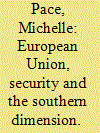

|
|
|
|
|
| Publication |
2010.
|
| Summary/Abstract |
With the coming into force of the Euro-Mediterranean Partnership, the European Union (EU) annunciated what one could term an 'inclusionist approach' to security whereby this policy framework was based on supposedly joint commitments by all parties concerned to 'cooperative security'. However, EU actions on the ground in the south have shown that, despite good intentions, such cooperative security endeavours have, thus far, hardly materialised. The result instead is an 'exclusionist' policy, where the reduction of illegal migration from the south takes top priority in EU security discourse. Post-9/11, in the policy area of 'counter-terrorism' measures, the EU likewise demarcates 'liberal zones of civilisation' from 'illiberal' ones, leaving the dirty work of counter terrorism to countries such as Egypt and Morocco. In terms of governmentality, this may be described as a 'surveillance and control' approach to security: therefore, it is argued here that the EU, through its governance model, is actually enabling further in-security and in-stability in the south.
|
|
|
|
|
|
|
|
|
|
|
|
|
|
|
|
| 7 |
ID:
101007
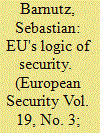

|
|
|
|
|
| Publication |
2010.
|
| Summary/Abstract |
This article develops a methodological approach to analyse the logic of security in the European Union (EU) as an inter-subjective construction. Security is established when discursive practices take place at the interplay of three different fields: (1) EU identity constructions; (2) the perception of challenges as security relevant; and (3) constructions of security practices and hence discourses on governance and governmentality. When discursive practices make cross-references between these fields they construct the logic of security. The empirical section applies this method in order to analyse the EU's logic of security at the turn of the twenty-first century. Understanding the dynamic effects at play between situations of under-development and conflict led not only to the construction of the need to implement civilian as well as military capabilities at the EU level, but this dynamic is also central to understanding the EU's way of approaching international terrorism.
|
|
|
|
|
|
|
|
|
|
|
|
|
|
|
|
| 8 |
ID:
101008
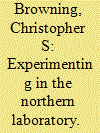

|
|
|
|
|
| Publication |
2010.
|
| Summary/Abstract |
This article explores the changing nature of security governance in Northern Europe since the end of the Cold War. Prior to enlargement in 2004 European Union (EU) involvement in the region was limited and cautious, with security governance driven predominantly by regional actors. At the same time, the connection between 'security' and projects of 'regional cooperation' was complex and largely interdependent. Since 2004 the EU has become more engaged in the region, most recently through its new Strategy for the Baltic Sea Region via which the north is conceptualised as a possible test case for broader conceptions of regional governance in Europe. The article argues that such developments raise significant questions, not only for the future and nature of regional security conceptions in the north, but also in respect of how the EU conceptualises itself in relation to security more generally.
|
|
|
|
|
|
|
|
|
|
|
|
|
|
|
|
| 9 |
ID:
101013


|
|
|
|
|
| Publication |
2010.
|
| Summary/Abstract |
This article analyzes the role that fields of discourses have played in constructing migration as a security problem, with a specific focus on the development of the Eastern dimension. It does so by looking at three relations: sub-region/region; speech acts/securitization; and professionals/insecuritization. Speeches and documents testify to the security narrative and consequent security governance associated to the enlargement process and to relations with neighboring countries to the East. Moreover, an analysis of the rationale behind governmentality practices regarding migration accounts for the wide usage of technological and risk assessment tools, adding up to the security construction of migration. The overall security governance that has arisen through and out of these processes allows an evaluation of a securitized approach to migration and the impact this has on European Union objectives on that sub-region, such as stability and human rights protection.
|
|
|
|
|
|
|
|
|
|
|
|
|
|
|
|
| 10 |
ID:
101006
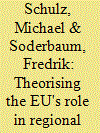

|
|
|
|
|
| Publication |
2010.
|
| Summary/Abstract |
This article seeks to contribute to the underdeveloped discussion about the way we theorise and conceptualise externally induced peace and security operations in regional conflict, with a particular focus on the EU's role. The framework draws on three theoretical components emphasised in this special issue: the construction of conflict, security governance and the impact of EU security practices. The EU's construction of the conflict is tightly linked to decisions about the mode of security governance and here we need to pay more attention to the often-neglected relationship between the external intervening party and the parties in conflict that are subject to the intervention. Furthermore, the impact of peace operations are usually analysed in terms of implementation and coordination failures, and in our view it is necessary to step back and address the construction of the criteria by which interventions are assessed - in particular, the way intervening actors construct and define 'success and failure'.
|
|
|
|
|
|
|
|
|
|
|
|
|
|
|
|
|
|
|
|
|